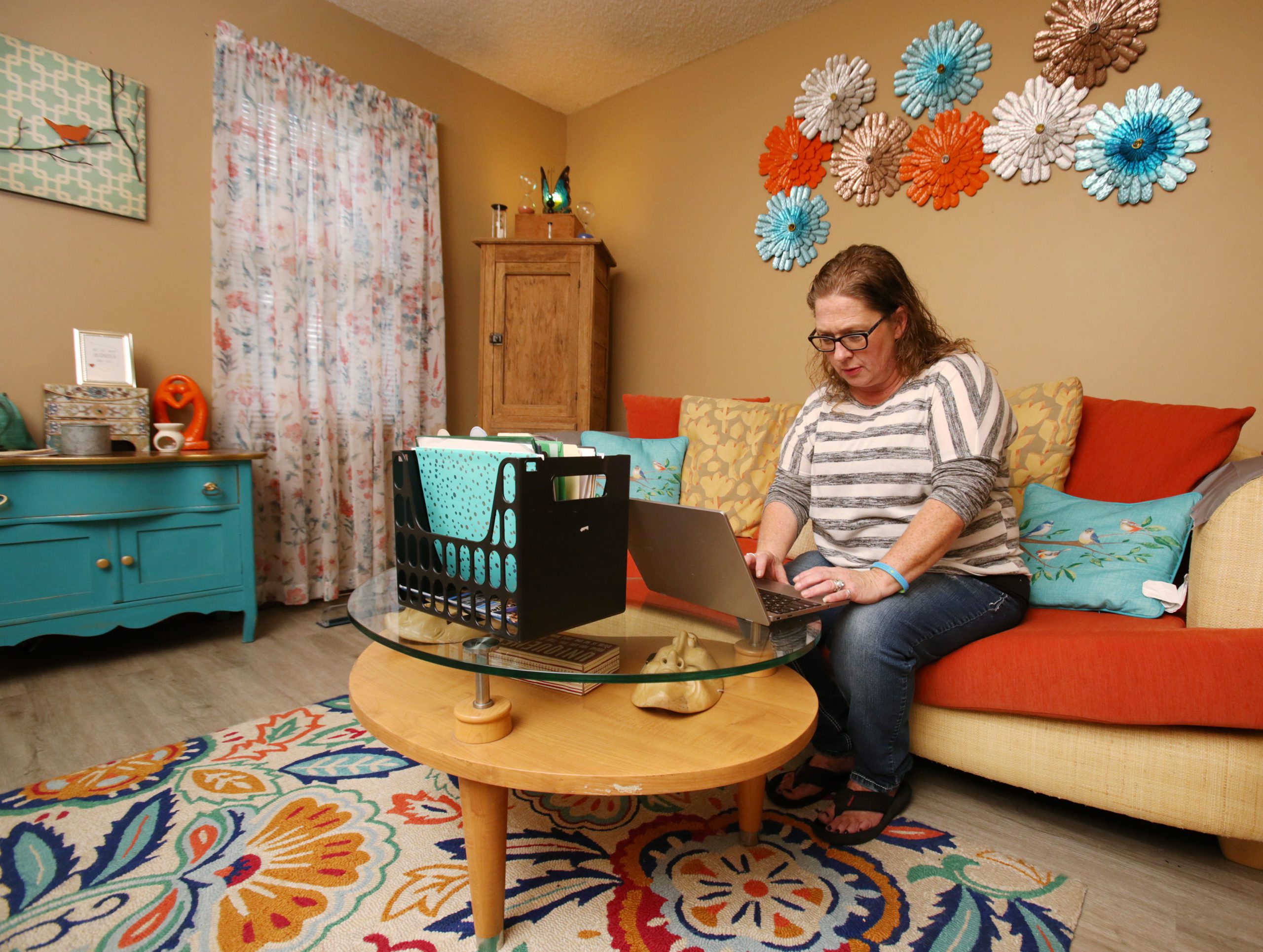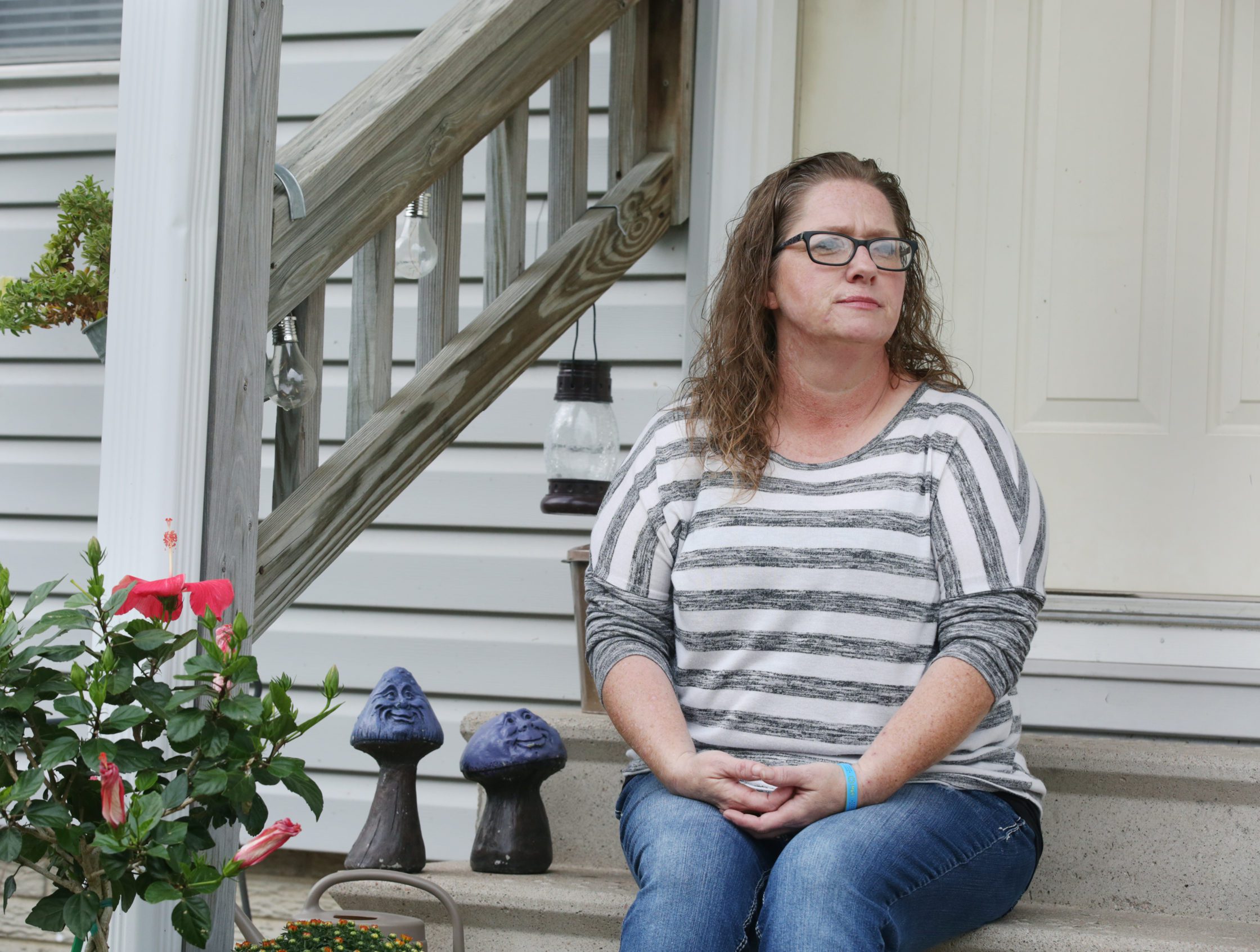Alison Reents was packing the final few boxes onto her moving truck when the police cars screamed up to her rental home three weeks before Christmas.
Officers closed down her residential street, threatening to take her into custody and cite her with trespassing.
The alleged crime that started all this? Failure to pay one month’s rent.
Reents, a single Hastings mom, lost her job near the beginning of the Covid-19 pandemic, joining millions of Americans who lost income and the ability to pay rent. In response, the federal government put an eviction moratorium in place, though the U.S. Supreme Court struck down the latest version of that moratorium in late August. Congress also earmarked billions of dollars in emergency rental assistance aid meant to keep tenants in their homes while ensuring landlords got paid on time.
But that money hasn’t always flowed to people, like Reents, who need it most. And, like Reents, many have been evicted during a moratorium meant to halt most types of evictions. More than 8,000 eviction cases were filed in Nebraska between Jan. 1, 2020 and July 31 this year.
Local governments — including many in Nebraska — have had trouble distributing their allocated rental assistance funds. Many tenants have expressed confusion about how to access aid, how to work with landlords to complete the proper paperwork, and who to turn to for help.
Those struggles have helped lead to this bottom line: As of August 25, only $6.5 million of the $158 million allocated for every Nebraska county outside of Lincoln and Omaha has been distributed to tenants and landlords.
Some 96% of the federal money remains unused.
The struggling rental assistance program has spawned countless stories like Reents’ — stories about financially strapped Americans who have fallen through a pandemic-era safety net meant to catch them.
“It becomes a full time job, and if you don’t know where or how to start, it’s impossible to get any assistance,” said Reents.
Reents was fortunate enough to find a rental home after she was evicted in December, but her journey to a new home was anything but smooth. After being served two eviction notices that resulted in her being escorted off the rental property, she sensed others were dealing with the same struggles. So she dived headfirst into a new volunteer job: Advocating for tenants like herself.
Her own story turned south last September, when Reents’ 13-year-old autistic son, Caden, tested positive for Covid-19. His illness, and her quarantine, made it harder to fulfill unemployment benefit work requirements, she says.
Reents had closed her online business earlier during the pandemic. She had paid rent on her Hastings rental home three months in advance, but recognized she would need help after that.
She applied and was approved for rental assistance for November.
Still, in early December, she was served an eviction notice from her landlord for failure to have the utilities in her name. Reents denies that occurred.
A week later her landlord served her another eviction notice, this time a seven-day notice to pay rent for November and a non-renewal statement for 2021. Amber Marker, Deputy Director of the Nebraska Housing Developers Association, had helped process and distribute Reents’ November aid, which hadn’t reached the landlord as intended.
Marker spoke with the landlord, who agreed to accept the payment. But he maintained his desire to evict through the non-renewal statement, Reents and Marker say, something the landlord was legally within his rights to do.
The landlord didn’t respond to two phone calls and a voicemail seeking comment.
“I don’t want to live where I’m not wanted,” Reents said. “But 30 days is not a long time to find a place.”
Reents was escorted off the property by local law enforcement in December when she was not moved out by the agreed upon time. She and her son moved into a motel room for six weeks. During this time, Reents was able to find a rental home. But for her, that six-week period represents one of the lowest, scariest points during COVID-19.
“It was tough, really, really tough,” she said. “During the pandemic everyone has taken refuge in their home. To not have one you can call your own and feel safe in, is an awful feeling.”
Reents now knows many tenants facing similar struggles after not being able to successfully access rental assistance money.
“This money can literally save someone’s life. I just don’t understand why it’s taking so long to get distributed when it’s just sitting there waiting to be spent,” she said.

Through the end of July, the state as a whole had paid out just $27.3 million — or 13.6% — of the $200 million in emergency rental assistance allocated for Nebraska by Congress. This isn’t uncommon: 89% of all rental assistance funds remain unused nationally, the United States Treasury Department recently announced.
In Nebraska, Douglas and Lancaster County, as well as the cities of Omaha and Lincoln, have separate programs for rental assistance and are tasked with distributing far less money than the statewide program. Combined, these cities and counties have successfully distributed more than half of the $41.4 million allocated for their tenants and landlords.
All other counties rely on the state to distribute funds, with mixed success.
Only one resident of the roughly 9,300 people who live in Wayne County had received rental aid by late August. Two residents had received aid in northeast Nebraska’s Cedar County, which has 8,500 residents.
In Lincoln County, which includes North Platte and has 35,000 residents, 98 applicants had received a total of $266,000 in rental assistance, records show.
The number of successful applicants was higher in Adams County, population 31,000, where Reents lives. Some 109 residents in the county, which includes the city of Hastings, had received a combined $210,000 in rental assistance.
Scott Mertz, housing justice project director of Legal Aid of Nebraska, an organization providing legal help to keep people in homes and avoid evictions, said these discrepancies in funding happen for a multitude of reasons.
“So many people did not know about this program until we walk them through it,” he said. “This is a massive undertaking and many of the people distributing money in Nebraska and in other states have never distributed so much cash assistance before, so there is a learning curve.”
Technology barriers and lack of cooperation from landlords sometimes exacerbate the problem, he said.
The application to receive emergency rental assistance is an online form that either renters or landlords can start. In most cases, both have to apply. The government distributors seek cooperation from both parties in order to process the application quickly and smoothly, Mertz said. The aid can help tenants pay past-due rent up to 12 months, and help make up to three months of future rent. It can also help with utility and Internet bills.
The complicated process inspired Reents to help others navigate it.
Reents has helped 12 people in her community apply for rental assistance. She has let several struggling tenants use her computer to fill out the application. She has hopped on phone calls to walk tenants through their rights and advise them on the next steps to take. She recently sat down with a father of three and his landlord and helped them fill out the application together.
“I’m just really passionate about this,” Reents said. “Something has to change. And if I can help anyone I will.”
The application process doesn’t always go smoothly, even when Reents is helping. Some tenants are denied aid because they do not know their landlord’s home address. Some tenants who live in the same house cannot complete the application on the same computer because it requires an unique IP address for each application.
And even if tenants are approved, the process can drag. The Nebraska Emergency Rental Assistance Program’s website says the “review process may take between 4-6 weeks from the time an application is submitted to reach a funding decision.”
“That’s a long time to be in limbo,” Reents said. “That’s a long time to wait, to be looking for a place. It adds unnecessary stress to an already stressful time.”
Times are about to get more stressful for renters on the financial brink.
By a 6-3 vote, the Supreme Court struck down the Biden Administration’s latest attempt to extend the moratorium on evictions. The plan would have held off most evictions until at least October.
Groups that represent landlords hailed the decision, saying that the moratoriums have been hard financially for some landlords. Tenant advocates say it makes a flood of evictions likely in the weeks and months ahead — especially if Americans continue to struggle accessing the federal rental assistance meant to keep them from losing their homes.
Accessing that assistance does appear to be getting easier. More Nebraskans are applying for and receiving the federal money to help them pay their rent, local experts say. The number of awards received has steadily grown for the last three months. Nebraskans who need help will be able to continue to apply for the money for months, and maybe into 2022, tenant advocates say.
“We don’t want to discourage or make it sound impossible to navigate,” said Mertz. “More and more people are accessing this money every week, and we have seen clients get caught up after having fallen behind for many months.”
RELATED STORY
Rental aid is available. Here’s how to access it.
Looking for rental assistance? We’ve collected contact information, websites and deadlines to help you navigate the process. Read more
After being evicted herself, and then helping others avoid the same fate, Reents hopes that more people can see the barriers that struggling renters must overcome. She hopes that we continue to try to lower those barriers, and keep people in their homes.
“It trickles down to everything and everyone,” she said. “Our court system is set up in a way that you can’t expect to be treated fairly. The scales are off. I’m almost thankful for the pandemic because we’re just now starting to see a lot of changes.”




1 Comment
Lauryn Higgins has left us with a poignant, disturbing and highly personalized view of how many of our fellow Nebraskans are poised on the abyss – good people suddenly homeless and hopeless through no fault of their own. And the outrage is focused: It didn’t have to be this way. Money and help were available that never got accessed in time. What makes this story so meaningful is it illuminates not only the problem – but, equally important, shines a bright light on the solution, on how to help those down on their luck. Terrific piece of quality journalism, Lauryn. Keep it going!